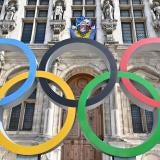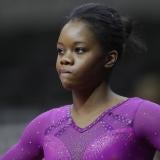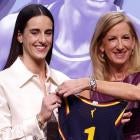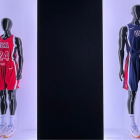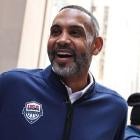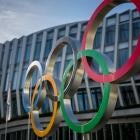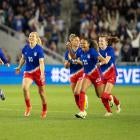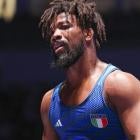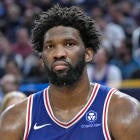
Gabby Douglas became a global sports star after she took home gold at the 2012 London Summer Olympics. She became the first woman of color, ever, to win gold in the All-Around competition. In addition to that, she became the first American gymnast take home gold in individual all-around and team competition at the same games.
Douglas has been doing press in the lead-up to the film about her life. The Lifetime Original movie “The Gabby Douglas Story” premieres Saturday at 8 p.m. as part of Lifetime’s Black History Month celebration. Gabby was kind with her time, very engaging, and you can follow her on Twitter here. She's also enjoying time this week working at the Super Bowl, and that's where our interview begins. Parts of this Q&A were edited for clarity and conciseness.
CBSSports.com: You’re so busy at all times, it seems. Between post-Olympic press tours, continuing gymnastics, writing a book, being a part of this movie -- have you really even had a week or two of downtime to yourself since the Olympics ended?
Gabby Douglas: Yeah, it’s just been really crazy and I’m still kind of going, you know? After the Olympics it was a little hectic. But I enjoy the ride and have gotten to experience some great opportunities. I have had some down time, though, before going back into training.
CBSSports.com: You’re at the Super Bowl. How different or similar it is to your Olympics experience?
GD: I think they’re very similar because everyone’s watching. I have nerves, the football players have nerves. The Olympics was the biggest competition of my life. This is the biggest game of their life. They [resemble] each other.
CBSSports.com: Are you going to attend the game? Brave the elements?
GD: I am. And I’m going to have to go shopping for mittens and stuff because it's SO cold here.
CBSSports.com: I'm not talking a suite here. You'll be in a seat, outside, at the game?
GD: Better: I’m going to be on the field. I'm a correspondent for "Inside Edition." I am going to be interviewing the players! I am so excited.
CBSSports.com: Are you a huge football fan, or was this more about this being at the Super Bowl and being part of such a huge event?
GD: I think this is such a great experience for me. I’m a huge, huge fan of football. My team is the Patriots, but they didn't make it, and I’m a little sad about that. But it's all good, because just being here, you know, it’s making me [cope with the Patriots' loss].
CBSSports.com: What did the Olympics change most in you?
GD: I learned a lot in going to the Olympics and having that experience. I learned, down the road, to keep fighting and never give up your passion. Because you don’t want to have regret. I learned how to be tougher. My skin got a little thicker. During the Olympics it was a lot of “hammer down, we're teams” and dealing with a lot of pressure. Life, in general, we’re going to have those moments when we’re pressured, when everyone’s watching. It’s definitely changed me.
CBSSports.com: Regarding the movie, you'll actually be in it, so what role will you have in this film?
GD: I play myself. Kidding! I’m kidding. I don’t actually play me. I pop up in the beginning of the movie, though. It’s just a cameo.
CBSSports.com: This is your life story after all, so how much involvement did you have with the film?
GD: My mom and I, we were so involved. They sad, "OK, what do you think about this part, this scene or this script." They’d send video to my mom and ask her, “What do you think about this girl portraying Gabby?” My mom would show me, and I'd say, "I like her, I like her." I actually went to the set the very last week of filming and gave in my input on gymnastics. I told them, "This is how this is done. This competition should be this way. This is how it is." I was very much in the loop.
CBSSports.com: You've watched the movie at this point?
GD: I have, I have. I love it. The spirit sits well with my family. It’s so different. It's not a book. It’s an actual movie on television. That's so crazy, but it’s amazing at the same time.
CBSSports.com: You're the youngest of four children. How much time do you get to see your family, now that you've moved out to be with them in California?
GD: A lot. I’ve been living with them, and it’s just great to be living with them again. When I moved away at 14, I lived with a host family. We love to have a great time, laugh a lot. They're the best siblings ever.
CBSSports.com: You and your family faced some economic challenges growing up. What were those?
GD: The movie will kind of touch on this. When I was born, I had a very bad [urine] disease. I'm all cured now, but my family and I were not the richest kids on the block. We lived in a van at one point. We were homeless. I had to move away when I was 14, to go to Iowa, because I saw this saw this special coach on TV (Liang Chow) that I fell in love with and wanted to train with him. Another big challenge was training on injuries or competing on those injuries.
CBSSports.com: What was the name of the disease?
GD: It was called "maple syrup." I don’t really know what it was. I couldn’t keep food down. I overcame it; I had it when I was an infant. [Ed. details on the disease here]
CBSSports.com: How long were you homeless for?
GD: We were living in the van when I was two months old and we were living in that van for about two to three months.
CBSSports.com: You've said you're hoping to compete in 2016 in Rio de Janeiro. Given the concerns surrounding the Winter Games, with talk of possible terrorism, would you be scared if you had to compete in a place like Sochi this year? Rio also could face similar challenges in a couple of years.
GD: You know, it’s very great to be aware of the problems, but I don’t think it's really worth focusing on or dwelling or being worried about it. You just have to go for it. You just have to pray that everything will turn out all right. I'm pretty sure someone would do something to keep the athletes safe and secure. At that point you do what you were called do do, perform in your sport, and win some medals.
CBSSports.com: So, as athletes, even if there are possible threats, you need to put faith organizers because otherwise it might affect your preformance? Is that accurate?
GD: I get that it’s great to be aware, but athletes learn how to adapt and not focus on, "OK, well, what’s going on outside." We’re just in a bubble and focused on what we have to do in that particular sport.
CBSSports.com: When will you begin full-force training? Do you have an idea of what your schedule will look like? What does your normal day consist of?
GD: I already have started training, and training right now is very intense. Getting everything back and focusing on doing and improving my upgraded skills. I train six days a week and four to six hours a day depending on what day it is. My gym schedule is very different each day. A normal day would be breakfast, do school, then go to the gym in the afternoon. I think a lot of people think we just do the gym for four hours straight. But we take breaks, stretch, do cardio, and I train on all four events, and then I stretch again, and I go home.
CBSSports.com: How often do you see and communicate with other members of the “Fierce Five”? (The rest of the American team from 2012.)
GD: We keep in touch like we’re sisters. We text each other and send videos and pictures to each other. But we all train in [different places around the country].
CBSSports.com: Which of the events you compete in induces the most fear? It seems like the balance beam would be the answer. Is that true for most gymnasts, and what about you?
GD: It’s different for everyone, but the majority of gymnasts would be the beam. It’s so intimidating. It’s so scary. It's so skinny. [I was able to be] more confident and master it was when I was like 15. It took me that long. I was really great at beam and loved it at 13, but as I was getting older, I didn’t like the beam and kept having mistakes at different competitions. I had to overcome doubt and fear of the beam. I learned to approach and attack the beam.
CBSSports.com: Do you still play the piano these days?
GD: I do. And I got a guitar. I got the guitar a couple of months ago. You’re going to have to teach me because I have no idea what I’m doing. I tried to do tutorials on YouTube, but I am so lost. It's an acoustic guitar. I bought it myself and my sister, Ariel, asked why I wanted a guitar. I said, "Because I love it." So when I got a guitar, she went and got a guitar, and I said, "See. Now you love it."
CBSSports.com: Who are your favorite artists to listen to? You're clearly a very musical person.
GD: I would love to do a duet with Taylor Swift with her guitar and my guitar! She is my primary inspiration.
CBSSports.com: If winning at the Olympics is the No. 1 memory of your life to this point, what’s No. 2?
GD: After the Olympics, there was this guy who, I think he worked with Tom Brady, and I said I'm a huge, huge Patriots fan. And I said I love Tom Brady. And he said, 'Oh, I have to tell him." Later that day, Tom Brady texted me. He wanted to congratulate me on the Olympics. I was totally on cloud nine. It was the best day ever.










